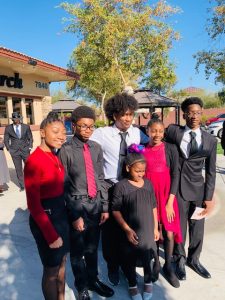
Photo of siblings after the home going celebration of their mother. Picture taken by Nadine McElroy.
“Let me not die while I am still alive.”[1] Such a profound revelation could only be spoken by someone lost in deep despair. Someone who has experienced the unexpected knock of death at their door. Death is like a thief that comes in the night (if we had known it was coming). As much we would like to be prepared for it, we are left totally in the dark without any weapon to defend ourselves when it comes. Death is personal, intimate, and natural, something each one of us must one day face. To pass from this world to the next is an expectation that flows from our religious experience of God in our lives, yet it is something we are never prepared for it or its aftermath of grief that follows.
Grief is an act or action that causes pain, distress, and sorrow. When someone your loved dies, they take a piece of your heart with them, leaving you to cope with not only the loss but learning how to live without them. Only through the presence, love, patience, and sharing of our pain with others can we find our way out of this valley of grief. To stay on our feet and keep breathing, we have to have hope and a desire to live, even though death has taken you away from us.
During the last two and a half years, my church family as well as my own family, suffered a significant number of losses. Moreover, like most churches, we did not have a ministry that provides grief care. After seeing the hurt, the pain, the grief and the suffering our parishioners were going through, I designed and implemented a grief support ministry that allows grieving to happen and gives those involved back their hope and their will to live. The majority of the ones who died left behind a spouse and, in some instances, young school-age children. With the approval of my pastor and the assistance of eight initial parishioners, we formed the “Heart to Heart” grief support ministry at St Mary Baptist Church in Pflugerville, Texas.
I soon discovered very little work had been done on African American grief compared to other ethnic groups related to their grief journey. Most of the studies concerning grief, mourning, and bereavement were done by psychiatrists and dealt with Educated White Americans and Europeans, predominantly white Christian widows.
I visited a grief ministry at a local church with the hopes of gaining ideas, practices, and tools in order to help establish a strong grief ministry at my church. The program they were using is well-known but I did not like the idea they used tape messages and follow-up was via a workbook. A session with a local mortuary revealed a social worker speaking to the group. It felt very impersonal and ineffective; people did not appear to be listening or participating in the conversation. This was not what I envisioned; I wanted the people in attendance to participate in the sessions, to express their feeling, their fears, and their pain. To talk with others who were experiencing the same hurt and pain, they were feeling. So together, we designed our grief support group to reflects the needs of the people in attendance, including selecting a name, writing our purpose, our goals, our guidelines, and lessons.
Before each meeting, we prayed and read scripture. Everyone was encouraged to participate, but no one was required to take part in the sessions. We cried, we prayed, and we told our stories and documented them as a way of release. Writing out ones thoughts, feelings and pain in a journal or blog, can be a highly beneficial therapy tool, and group participants were encouraged to do so. All lessons are scriptural based and explained using the Bible as our primary reference. Anyone could leave the group at any time without the group asking why. They all agreed that everything said in the group was confidential and stayed in the group unless it was felt that a member would harm him or herself. The first six lessons we discussed were chosen because of the immediate needs of those in the group.
Overall, there was a sermon that helped me understand even more the ups and downs as well as the mental toll grief takes on us. As I reflect on what my ministry is, it is my hope that we use the grief we face as a strengthening of our faith and belief in God.
[1] Rabbi Cohen, https://tbsoc.com/2017/10/sermon-yizkorz6/24/10
Week 1 lessons entitled: My Loss, reference scriptures Psalm 34:18, 147:3; John 14:1; Matthew 5: 4; Revelation 21:4.
Week 2 lesson entitled: The Meaning of Grief: reference scriptures Psalm 9:9, 18:2, 22:24, 23, 27:4-5, 30:5, 34:18, 37:39
Week 3 lesson entitled: Obstacles to Recovery From A Loss, reference scriptures Ecclesiastes 3:1-8, Numbers 6:24-26, Psalm 37:23-24
Week 4 lesson entitled: How Do You Say Good-Bye: Psalm 38:18, Revelations 21:4, John 14:1, Joshua 1:9
Week 5 lesson entitled: How Do You Recover From Your Loss, Romans 8:28, Matthew 5:4, I Thess. 4:13-14
Week 6 lesson entitled: Growing from Your Loss, John 11:25-26, Psalm 23:4, I Corinthians 15:51-57
The object of the ministry is to lead them through the grief process with as little trauma as possible by assuring them they were in a safe place and could express their feelings, thoughts, and needs, praying that it would lead them to share what was on their hearts, leading them to a new hope. To support each one as they learned to grow and to face the new challenges life would bring their way. It gave them what they need to regain their faith, hope, and will to live.